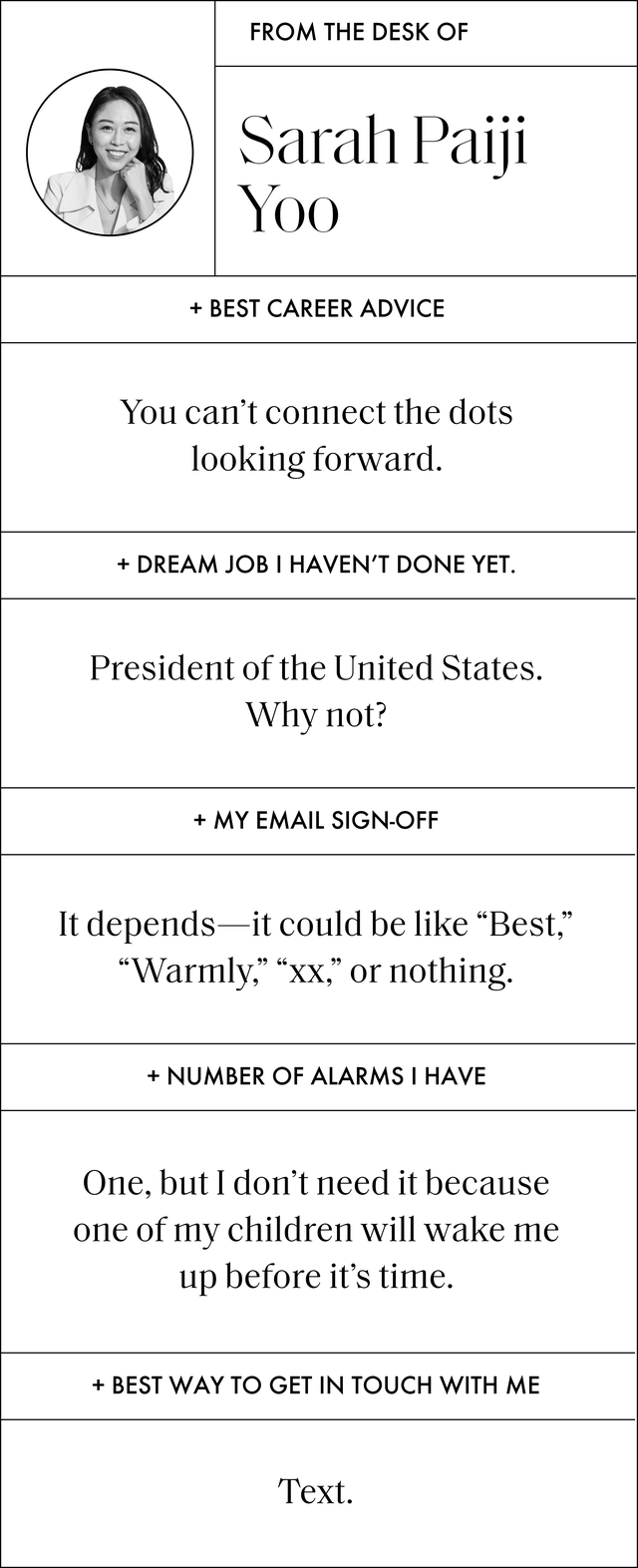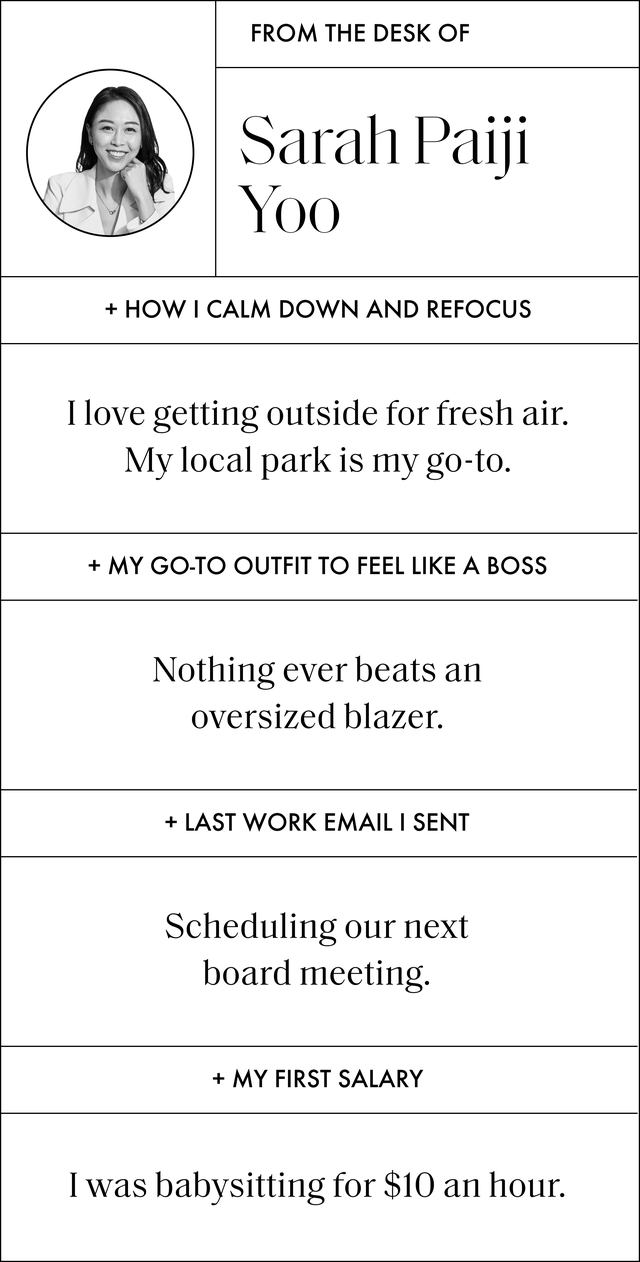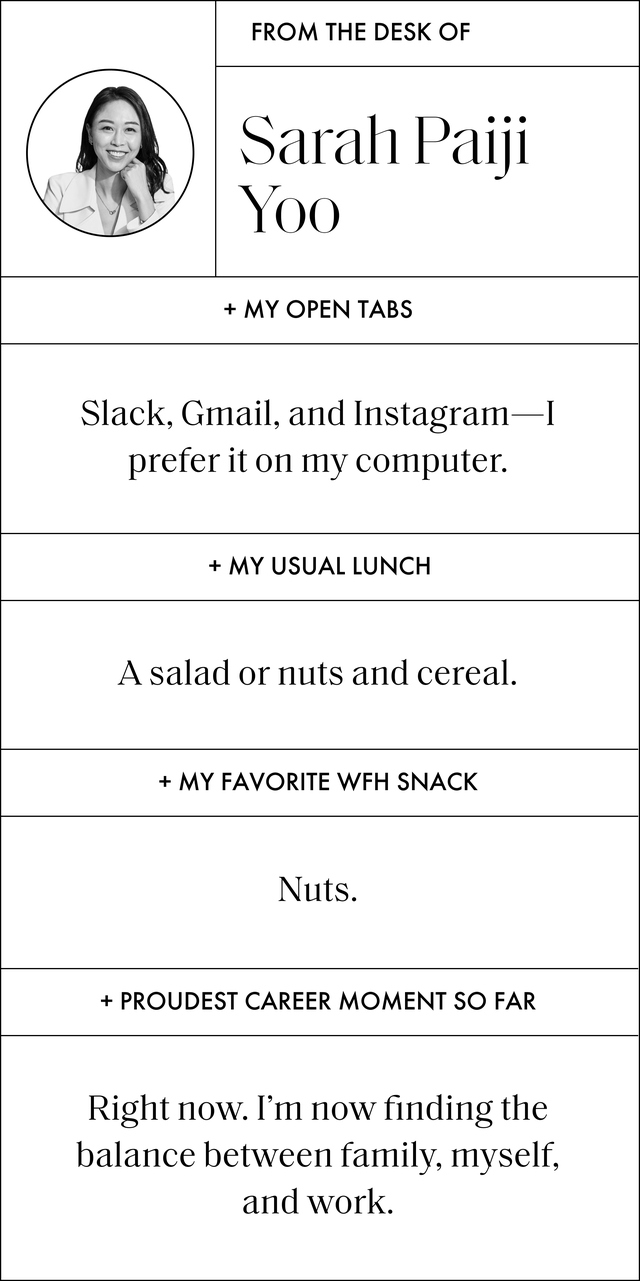In ELLE.com’s monthly series Office Hours, we ask people in powerful positions to take us through their first jobs, worst jobs, and everything in between. This month, we spoke to Sarah Paiji Yoo, co-founder and CEO of Blueland, a brand specializing in cleaning products and self-care essentials that aim to eliminate single-use plastics. As a serial entrepreneur who’s appeared on Shark Tank, she’s well-versed in what it takes to launch a successful business. And as a person living on this planet, she also knows the importance—and challenges—of fighting climate change. Below, Yoo takes us through her entrepreneurial journey, the ups and downs of working in the sustainability space, and why her company petitioned the EPA to remove polyvinyl alcohol from water.
My first job
My first desk job was in college; I worked for the admissions office at Harvard for four years in undergraduate minority recruitment. It was something I felt deeply about when applying to Harvard because I felt like people like me don’t go to [school there]. When I learned there was this program at Harvard that proactively reached out to minority communities or underrepresented communities, I was really intrigued. It was great to be paid to travel the country going to high schools and talking about Harvard, encouraging and hopefully inspiring kids to apply.
My worst job
Investment banking. I was an economics major, and it seemed like the pinnacle of your career if you’re going into business. I was so glad I was able to do it for a summer because I quickly realized it wasn’t for me. I was one of the very few women on the floor, and there was, at that time in my group out of 14 managing directors, only one female. It was hard for me to look around and see that as a place where I would be successful because there weren’t people who looked like me who were successful in that culture and lifestyle. This was in the heyday, and there was a lot of screaming that happened in the office, and in the women’s restroom, there was a lot of crying that I saw from more senior leaders. It was very clear that it wasn’t the type of place I wanted to start my career or could see myself thriving. Also, thinking back, I can’t believe we used to walk around work in pencil skirts and four-inch stiletto pumps—it’s crazy. Women were wearing literal skirt suits. You had to keep a separate pair of shoes at work because the shoes you were “expected” to wear were so ridiculous.
On removing plastics from my household and how that led to Blueland
I had just become a new mom with the arrival of my first son. I breastfed him for 11 months. When I was transitioning to formula, I did a lot of research on not just the baby formula, but also the water that I would use. That’s when I learned that we have pervasive microplastics in both our tap water as well as bottled water. It wasn’t until then that I started to connect the dots between all the single-use plastic we use and how it’s ending up in our oceans and environment—and how it’s now showing up in the food we eat and the water we drink. At that point, I really wanted to cut out all single-use plastic from my family’s life; I quickly realized it was impossible. Everything, not just cleaning products but medication, lotion, and snacks, came packaged in single-use plastic. I had this aha moment that, beyond my family’s tiny personal consumption, I could have a much bigger impact if I could find a way to provide other people with more options that didn’t come packaged in single-use plastic.
As I learned more about plastic pollution and the climate crisis, it was tough. I wondered how we all weren’t just spending all of our waking hours urgently working towards this goal of ending climate change. I was pretty overwhel med by how massive the problem was and how little time we had. I think Blueland is a great solve for that.
How my previous experience with startups prepped me to build Blueland
My startup experience helped me show up for Blueland much more clear-eyed and clearheaded about what we’re building. My biggest takeaway is when you are starting a business—especially one that’s venture-backed—it isn’t an all-in commitment. To really have the stamina and interest to see that through, it has to be something that you are so deeply passionate about. In my first five to 10 years of entrepreneurship, simply the challenge of bringing something new—a brand or product—to market that had never existed before was enough for me. That alone gave me a lot of excitement and energy. When I became a mom, I had something else I care deeply about that was competing for all the time I was pouring into work. I realized I needed more meaning in the work that I was doing. I made a difficult decision to step away from the businesses I was working on, which at that point I just wasn’t finding fulfilling enough.
What it was like to be on Shark Tank
It was the most terrifying thing to go through and to prepare for. I started my entrepreneurship around the same time Shark Tank became a show, so it was always—half-jokingly, half-seriously—on my list to be on Shark Tank if I had the right business. When I realized Blueland was a business I wanted to pursue, very early on I told my partner I’m going to take this to Shark Tank. This is perfect; everyone cleans, I thought. So, as soon as we had a viable product, we applied. Every step along the way, you’re not sure; even to the point where you’ll go to L.A. for a week and film and there’s a 50 percent chance it’ll actually air. You put a lot of heart and work into it, and there are no guarantees that the episode will air, and if it airs, how you and your company will be treated in the edits. I feel so grateful to have had the experience; I’ve never experienced anything like it—we prepared for it a ton, and the episode ended up doing really well for Blueland. We filmed that just one month after we launched, so there was very little awareness about Blueland, and it definitely got us to a meaningful first stage. Kim Kardashian happened to watch that episode, too, and she just started tweeting about it nonstop; that was really fun.
My best advice for starting a business
It’s the same as what my dad would say to me when I was little, which was a joke: “How do you eat an elephant? You just have to get started.” That’s helpful advice I always come back to, especially with my personality. The first deck I took to my first investor for my first startup was 60 pages long. I felt like I had to think through everything before I could get started. The advice is helpful because there is no perfect way, and you can’t do it all at once. You learn so much once you get started making a product, and getting feedback. You’re going to iterate based on that versus feeling like you can have a magic ball to predict how it’s all going to unfold. I think the same goes for timing. I find that a lot of people wait for the timing to be just right, either from a career perspective or a life perspective, or even with starting a family. I think very rarely is the timing exactly right. If you can get started now, imagine where you’ll be in a year if you just take a leap.
For those looking to start in the sustainability space, the good news is that there are no shortages of incredible NGOs, non-profits, and certification agencies you can work with. Instead of trying to recreate the wheel from scratch, you can stand on the shoulders of true giants that have been doing some of this work for decades. Sustainability is so complex; there are so many nuances. When we started Blueland, we were focused on reducing single-use plastics but didn’t want to be so focused on single-use plastics that we were doing a disservice, whether it was on the carbon emissions end, [or with] energy use, water stewardship, or worker conditions. Even before we wanted to create cleaning products, we worked with an organization called Cradle to Cradle and we’ve had them ever since. We’ve learned so much from them and certainly would have had so many blind spots if it wasn’t for that partnership.
On the challenges of working in the sustainability space
There are so many challenges on so many levels. One is that a lot of individuals really question how much of an impact they have and how much their personal actions actually matter. I recently looked at an individual’s climate footprint in relation to the global impact, and it’s incredibly small. Individuals shouldn’t shoulder all of the burdens; it’s okay if someone puts a straw in your drink—enjoy the drink; that in itself is not the end of the world. That said, it’s really important for individuals to feel empowered and know that their actions do make a difference. When our behaviors and preferences change, that’s when culture changes. Unless culture and our preferences change, businesses aren’t going to be incentivized to make a change, and certainly, we’re not going to see as much movement on the government side. In this day and age, we are unfortunately in a place where climate has become a very partisan conversation, but I do think one way through is that the more we all, as individuals, can agree on things like cutting back on single-use plastic and emitting less carbon, the climate can move to be more of a bipartisan versus a partisan conversation.
With that, I do have a book that just came out, called Wake Up, World. It’s a book for children and their parents to read together. It’s meant to inspire and educate both children and their parents so they realize that our individual actions do matter and make a difference. As a parent, and one who’s very passionate about sustainability, I’ve struggled to find a lot of great books about the topic and I’ve also just observed, having a 6-year-old and a 2-year-old, that children are so sweetly impressionable. The book follows a little boy who takes these small actions and inspires his friends to take these small actions, which inspires their school and local businesses and, eventually, the government to take action. It was a really nice way to show that small actions really do matter.
How I stay optimistic despite the dire circumstances centered around climate change
I read a lot of the facts daily, which can be overwhelming while the problem can seem insurmountable. At the same time, I am so optimistic. I truly believe that in as little as 20 years we can be in a world where single-use plastic and single-use culture will be a thing of the past. We’ll look back at how wasteful we once were and recognize it’s crazy that we’re trading our planet and our future for the sake of convenience and profits. The bans on plastic straws and bags are really just the beginning; those bans have come into place because people understand the problems with single-use plastic. I see a world where businesses will create more green products as consumers will start demanding more sustainable products. I’m a big believer that doing the right thing will be better for business, generate more revenue, more brand love, and drive higher margins—especially in a world where there will be a tax on carbon and pollution. I’ve seen firsthand how being a sustainable business helps us attract and retain better talent. With those pieces, I think there will be more government policy and legislation banning single-use plastic. We’re already seeing extensive bans across a wide range of single-use plastics in Canada, the EU, the U.K., Australia, Taiwan, and Thailand. This is the tip of the iceberg—there really has been so much progress even in the past handful of years. I’m really hopeful that we can make a lot more progress in the next two decades.
Why it was important to fund research on the degradation of polyvinyl alcohol
We never had this grand plan with the PVA (polyvinyl alcohol) research and the petition to the EPA. We certainly didn’t think we would be commissioning such large-scale research. We were just exploring laundry because, at some point, we were going to launch products in that category. We were floored to learn that pods, and this new category of laundry sheets, were plastic. That plastic is going down our drains into the oceans and our environments; it’s not just a plastic bottle that can be recycled or sent to a landfill. That’s one of the best parts of being a founder: you can pursue the passions and issues you feel strongly about.
There was no research on what happens to this plastic once it enters a wastewater treatment facility and the environment, and we felt like that was a big thing that producers of these pods and sheets could hide behind, because it wasn’t proven that the plastic wasn’t degrading at a wastewater treatment plant or that it might end up in the oceans. We decided that it was something there absolutely should be research on, and that was a natural next step. It took about a year to identify an organization, Plastic Oceans, to take on this research. Once the findings came out that about 75 percent of this plastic was ultimately released into our waterways, we couldn’t stop there. We needed to get it published—it was really important from a credibility perspective. We also wanted to take additional action, which is what led us to petition the EPA.
I think and hope there will be a lot more advocacy in our future. It’s a hard balance as a still relatively young brand and a small team in terms of the number of things we take on, and ultimately, we need to make sure we’re focused on the areas that are most important to us, where we can have an impact. PVA is certainly an issue that we’re committed to, and we’re committed to exploring other ways to spread awareness and make progress on the policy. We’re also interested in getting more involved in advocacy and policy, so you’ll definitely see more from that end in the future.
On the future I hope to create as Blueland grows
The future really is a world where both businesses and individuals are advocates for the planet and thoughtful, responsible production and consumption. There is so much opportunity for us on the consumer side, and our mission has been less about our specific products and more about how we make it easy for individuals to make more sustainable choices. On the business side, there’s no shortage of things we can do. Even within the categories that we operate—cleaning products primarily and, to some extent, personal care—these are $100 billion categories that are conventionally massively polluting. It’s been exciting to see in the cleaning category, for example, major players—that are thousands of times our size—now have their answer to Blueland. That shows that there are more businesses out there encouraging reuse and moving consumerism away from single-use culture. In the big picture, this is nothing but good.
This interview has been edited and condensed.

Dale Arden Chong is the Senior Fashion Commerce Editor at ELLE.com. Previously, she was an editor at MensHealth.com and has written for Who What Wear, GLAMOUR, The Coveteur, and more. She loves fashion, food, and art, among other things—but her greatest love is K-pop idol V of BTS.










